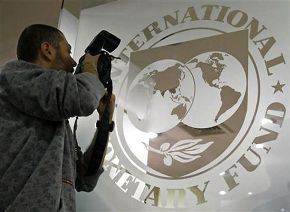The International Monetary Fund (IMF) on Thursday reiterated that internal factors played a much larger role in pulling down India’s economic growth in recent years than external ones.
 “External factors have generally been much less important compared with internal factors for some relatively large or closed economies, such as China, India and Indonesia,” the Fund said in the analytical chapter for its World Economic Outlook, to be released later this month.
“External factors have generally been much less important compared with internal factors for some relatively large or closed economies, such as China, India and Indonesia,” the Fund said in the analytical chapter for its World Economic Outlook, to be released later this month.
The analysis took India as a comparatively closed economy so far as merchandise exports are concerned. “Brazil and India have low levels of goods trade exposure to advanced economies and are relatively less open among the sample economies.”
Besides China, India, Indonesia and Brazil, the sample comprises Argentina, Chile, Colombia, Malaysia, Mexico, the Philippines, Poland, Russia, South Africa, Thailand, Turkey and Venezuela. Brazil and India have low levels of goods trade exposure to advanced economies and are relatively less open among the sample economies, the chapter said.
However, the chapter “On the Receiving End? External Conditions and Emerging Market Growth Before, During and After the Global Financial Crisis” pointed out that stronger external demand has a lasting positive effect on emerging market economies’ — including India’s — growth despite the attendant rise in the 10-year US treasury bond rate.
“The impact tends to be stronger for economies that are relatively more exposed to advanced economies in trade (for example, Malaysia and Mexico), but also stands out for some others (for example, India and Turkey),” it observed.
The relatively high impact elasticity of India’s growth to US growth could reflect the fact that the Indian economy is more closely integrated with that of the US than is implied by a measure of integration based on the share of India’s goods trade to advanced economies. This is notably through its sizable service sector exports (for example, outsourcing).
Therefore, even as domestic factors played a larger role in reducing India’s economic growth, the role of external factors were also important.
“Even for the Indian and Indonesian economies, in which variance in growth is predominantly domestically driven, the share of external factors is still in the range of 25 to 30 per cent.”
The analysis said that in India, internal factors began dampening the growth in early 2008, as the result of tensions from growing bottlenecks in infrastructure after a period of rapid growth. “Their negative incidence continued until mid-2009, when internal factors started contributing more to growth again.”
India’s economy grew over nine per cent in each of the three years preceding the global financial crisis of 2008-09. While growth came down to 6.7 per cent in 2008-09, it recovered in the following two years and moderated a year after that.
However, in 2012-13, economic expansion was even slower at 4.5 per cent than in 2008-09. For 2013-14, economic growth is projected to be a tad higher at 4.9 per cent, compared to 2012-13, but quite lower than the level of 2008-09.
The chapter said that internal factors appear to have been pulling down growth in some economies in recent years. In China, these factors were largely depressing growth after late 2010, but there is a small uptick in their contribution in the last quarter of 2012.
“A similar picture emerges for India, wherein internal factors reduced growth from 2011 until the third quarter of 2012, but there is an increase in their contribution since late 2012,” it said.
The chapter also pointed out that growth since 2012 has also undershot the level predicted given current global economic conditions for nine of the 16 economies, suggesting again the role of internal factors. This group comprises Brazil, Chile, China, Colombia, India, Russia, South Africa, Turkey and Venezuela.
Earlier, in its staff report prepared after discussions with Indian authorities, the Fund had attributed much of India's economic slowdown to domestic factors such as “heightened policy uncertainty”.











